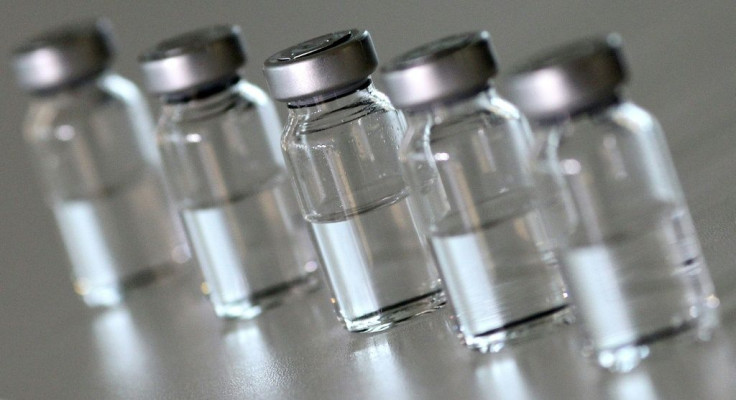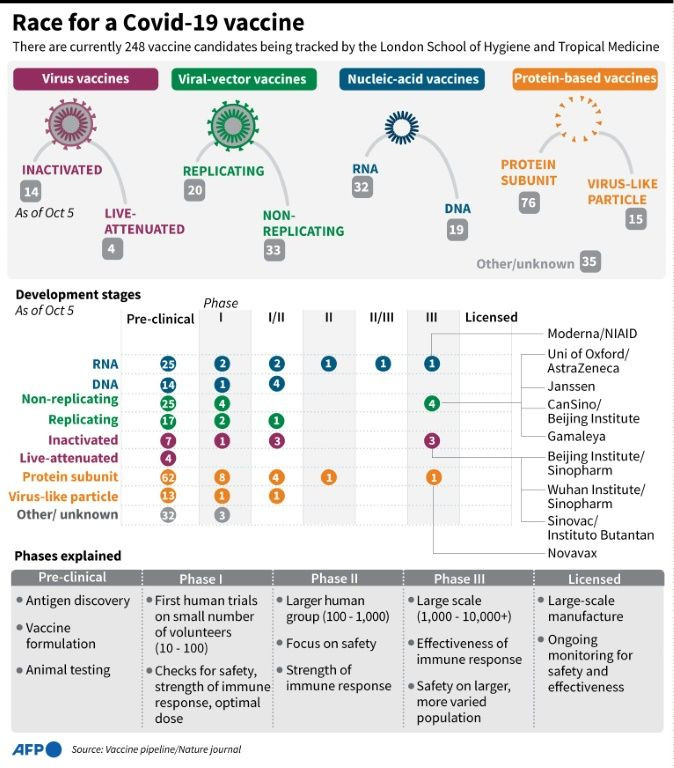Covid Vaccines: Why The Safety Process Reassures Experts
Covid-19 vaccine emergency approvals are around the corner, makers are preparing to ship millions of doses -- and experts are trying to reassure the public that the record-breaking speed of development hasn't compromised safety.
One statistic that is key to these persuasive efforts is that almost all side effects from vaccines occur in the six weeks following immunization.
Participants in the huge trials for the Pfizer-BioNTech and Moderna-National Institutes for Health jabs, the two frontrunners expected to be greenlit in December, were monitored for two months after the second dose -- a requirement of the US Food and Drug Administration.
"There is a difference between fast and too fast," Saad Omer, director of the Yale Institute for Global Health told AFP.
Two months in fact covers the "overwhelming majority" of what are referred to as "adverse events," he said.
In ordinary times, the FDA requires six months of follow up.
But if nothing is revealed in the first two months, it's very rare to see anything in the next four -- and the gravity of the public health crisis has altered the risk-benefit calculations.

"At this point where we are in the pandemic, we have to think about not waiting for the perfect data, although I want the perfect data," said Grace Lee, a professor of pediatrics at Stanford who is a member of an advisory committee on vaccines for the Centers for Disease Control and Prevention (CDC).
The most reassuring thing about the current trials is their size: 44,000 volunteers for Pfizer, while Moderna has 30,000.
Around half of the volunteers have so far been studied for at least two months.
The FDA will therefore have safety data on tens of thousands of people, which is far more than the average of 6,700 people for other vaccines authorized in the past decade.
Both makers said that after two months of receiving their second dose, there were no "serious" side effects -- those which put a patient's life in danger, require hospitalization, or cause permanent disability.
This category includes dangerous allergic reactions (anaphylactic shock), neurological problems, and of course death.

What they did observe was fatigue, headaches, body aches, joint pain, redness and pain site of the jab, especially after the second dose.
These "Level 3" or "severe" events, in medical jargon -- resolved without hospitalization, occurred in only a few percent of people and are deemed acceptable.
The FDA will nevertheless be studying much more detailed safety data than was communicated by the two makers in their press releases.
Experts have so far been reassured by the apparent absence of "vaccine enhanced disease," that is to say signs that the medicine made things worse not better, as was observed with a vaccine against respiratory syncytial virus in the 1960s.
After the possible authorizations, monitoring or "pharmacovigilance" efforts will continue for years.
Well-established systems exist in the United States and in Europe to statistically detect any increase in serious medical events in the vaccinated population, and to confirm cause and effect.
For influenza vaccines, for example, the CDC has detected a possible tiny increase in the number of cases of Guillain-Barre syndrome (where the immune system attacks the nervous system).
And even among those rare cases, all happened within six weeks of inoculation, said Edward Belongia, a scientist at the Marshfield Clinic Research Institute who's been researching flu vaccines for the CDC for 15 years.
Post-authorization surveillance led to the withdrawal in 1999 of the first rotavirus vaccine in the United States, nine months after its authorization.
Rare cases of bowel obstruction had been observed in young children two weeks after vaccination.
In general, though monitoring leads to use restrictions on certain groups, rather than withdrawal, said Omer.
Skepticism varies by country. In China, 88 percent of people polled by the journal Nature in June were ready to be vaccinated, compared to 59 percent in France and 55 percent in Russia.
This summer, as suspicions arose that President Donald Trump was pressuring the FDA to approve a vaccine faster, some Americans became more hesitant.
The trend has passed since he lost the election, according to an Ipsos poll conducted this month.
© Copyright AFP {{Year}}. All rights reserved.





















